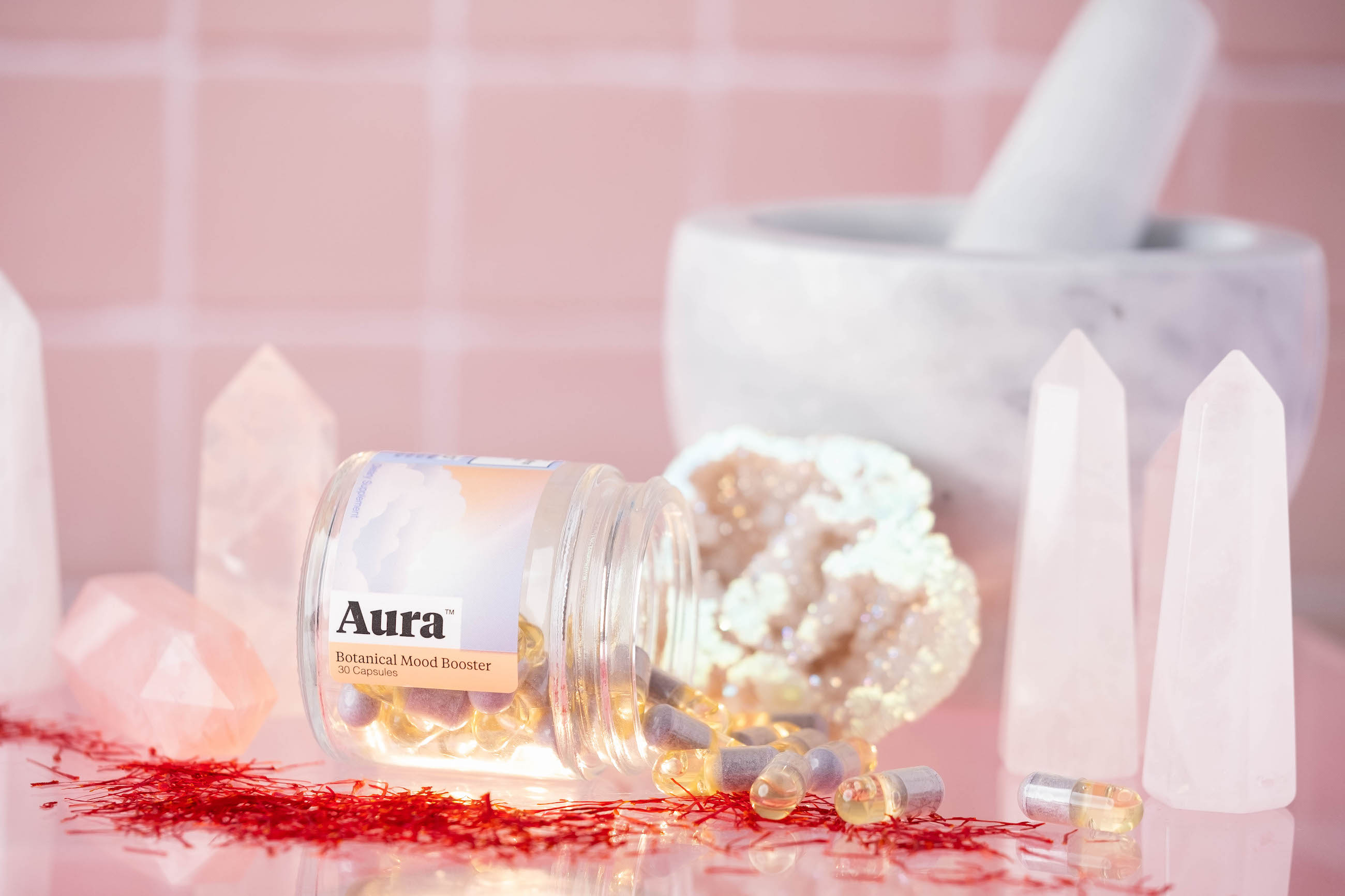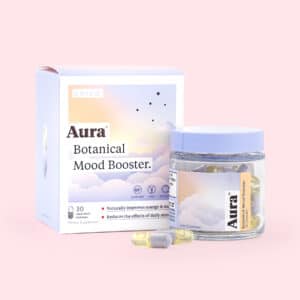Taking saffron for depression is becoming more and more common, as compelling research continues to unearth a fascinating benefit of this rare spice.

Spice is Nice.
When you think about spices, what comes to mind? Warm, rich flavors found in a mug of Mexican hot chocolate?
Fragrant powders used in carefully measured amounts for a curry?
Or perhaps you think about that one time you tried a dish so spicy it made your eyes water and opened your sinuses!
Spices can serve a number of functions in our lives, and most of us associate them with cooking, and adding flavor to our favorite foods.
But did you know that some spices have health benefits beyond their powerful flavor?
Spices can assist in things from helping us lose weight, to even improving our mental health.
It’s true- the trick is just finding the right spice for the job.
Saffron, a rare and exotic spice, is shown in studies to be an effective spice for treating mood and anxiety disorders.
How can you get all the benefits from saffron?
Let’s take a look.
What is saffron?
Saffron is a spice that comes from the flower Crocus sativus, which is primarily cultivated in Greece, Iran, Morocco, and India.
If you’ve got some culinary knowledge about saffron, then you know that this exotic spice is the most expensive spice in the world.
Why is this the case?
Saffron is expensive because of its delicate and labor-intensive harvesting methods.
The threads of saffron come from the stigma of the saffron flower, and each flower only produces three threads.
To add to this, saffron flowers are extremely delicate.
The threads must be plucked by hand on the same day that the flower blossoms. Before dawn.
You can see why this delicate spice is so coveted.
Chefs often use saffron to give their food a bright yellow color, and to provide an earthy, floral flavor to their dishes.
While it is a beloved spice in any chef’s cupboard, the most valuable use of saffron might not be in the kitchen at all.
Traditional Ayurvedic medicine has featured saffron for centuries as an adaptogen with several health benefits.
But only now is it starting to gain popularity for its uses in modern medicine.
It contains several antioxidants that contribute to most of this spice’s health benefits.
Antioxidants are the powerful, free-radical fighting compounds in many of the world’s healthiest foods.
They keep us healthy, can keep our skin looking youthful, and as we are about to learn, can even help improve our mood.
What are the active parts of saffron?
The main biologically active components of saffron are its carotenoids or carotenoid derivatives.1,2
The main carotenoids in saffron are:
- Crocin
- Picrocrocin
- Safranal
These carotenoids correspond with the color, bitter taste, and aroma of saffron.
Carotenoids are the bright yellow, orange and red pigments present in various plants that also have strong antioxidant activity.3
You may be familiar with beta-carotene, a carotenoid found in carrots and other healthy vegetables that is a precursor to vitamin A.
Other well-known carotenoids such as lutein, zeaxanthin, and lycopene also have widespread benefits to health.
The picrocrocin and safranal in saffron are thought to be derived from zeaxanthin.
The current research suggests that the carotenoids in saffron work together in a synergistic manner to provide the following benefits:
- Scavenge free radicals
- Reduce inflammation
- Inhibit the growth of harmful cells within the body4
These components derived from the stigma of the saffron plant aren’t the only parts that show antioxidant potential.
The bright purple petals of the saffron plant may also be beneficial for health due to their antioxidant content as well.
How Does Saffron Help With Mood?
Mood disorders, like depression and anxiety are two of the most common mental health disorders in the United States.
Data from the CDC show that nearly 1 in 12 U.S. adults report being depressed in a two-week time period between 2013-2016.5
A more recent survey from 2019 found that over 15% of adults experienced symptoms of anxiety during a two-week time period.6
Because of stresses from the COVID-19 pandemic, the prevalence of depression and depressive symptoms may be increasing.
One study published in 2020 sought to do a survey comparing the prevalence of depressive symptoms prior to and during the pandemic.
Results from the study showed that prevalence of depressive symptoms was more than 3 times higher than they were prior to the pandemic.7
With rates of mood disorders and generally increased stress during the pandemic, people are looking for natural ways to reduce their symptoms.
Therapy and appropriate prescription medications are first-line and evidence-based methods for treating mental health concerns.
Healthy habits like yoga, cold therapy, singing, exercise, and spending time with loved ones can also improve mood by increasing vagal tone.
Supplements can be also be used as a support for mental wellness, but keep in mind they are not a treatment.
NOTE: You should always consult with your doctor first before starting a new supplement. If you are concerned about the state of your mental health, speak to your doctor, and be sure to tell a close friend or family member to keep them informed.
There is a growing body of evidence supporting the use of saffron for its mood boosting effects.
It is quickly becoming one of the most effective natural supplements for depression, and will continue to gain popularity as even more research emerges.
A Look at the Research
Scientists are still figuring out the mechanisms of action on how saffron benefits the mind, but it may activate certain neurotransmitter pathways, reduce inflammation in the brain, and support the growth and survival of our neurons.
Saffron may increase the effectiveness of selective serotonin reuptake inhibitor (SSRI) drugs, which is the most commonly prescribed class of antidepressants.
A 2015 randomized trial had 40 patients with major depressive disorder take an SSRI with either crocin (one of the main saffron antioxidants) tablets or placebo tablets for 4 weeks.
While both groups experienced improvements in mood and quality of life by the end of the trial, those who took crocin had greater improvements in all of these measures.8
So far, the research appears to be consistent in showing the benefits of saffron flower petals or stigma threads as an effective supplement for improving mood.
A 2019 review and meta-analysis of 11 studies suggests that use of dried saffron or saffron extract for 6 to 8 weeks was significantly better than a placebo at improving mood-related symptoms and was generally equivalent to the standard treatment.9
While most of the research on the mood-enhancing benefits of saffron are focused on depression, there is evidence that saffron may be effective for other mental health issues as well.
Saffron May Have Benefits Beyond Depression
In a study published in 2016, saffron was compared to diazepam to see how it could reduce pre-surgery stress.
Patients were given a single dose of either a saffron extract or diazepam before their surgery, and their stress levels were measured before their dose and 3 hours later.
Saffron had a slightly greater effect on decreasing acute stress than the medication.10
A recent 2020 review suggests that saffron has neuroprotective effects for conditions such as:
- Alzheimer disease
- Parkinson disease
- PTSD
- Schizophrenia
- Stroke
- Epilepsy11
While saffron should not be seen as a treatment for these conditions, it may be a helpful addition to a treatment plan provided by your doctor.
Even individuals without a history of mood problems may benefit from taking saffron.
Saffron is effective for many ailments, but how much saffron should you take per day?
How Much Saffron for Depression?
A 2017 study investigated the effectiveness of a standardized saffron extract on mood in a group of adults with self-reported low mood.
Participants either took varying doses of the saffron extract (22 mg or 28 mg) or a placebo daily for 4 weeks.
At the end of the trial, those who took the 28 mg dose had a decrease in negative mood and symptoms related to stress and anxiety compared to a placebo.12
Research suggests that 15-30mg per day of a standardized saffron extract is most effective for treating the symptoms of depression.
As with any supplement, the effective dosage may vary from person to person.
While most studies on saffron for depression used between 20-30mg per day, it is best to start with 10-15mg per day, to evaluate how your body responds.
Are there any risks from taking saffron?
Saffron is generally safe at its clinical doses between 200 and 400 mg per day, and large doses do not appear to have any toxic effects on major organ systems.
Side effects from taking between 1,200-2,000 mg of saffron may include:
- Nausea
- Vomiting
- Diarrhea
- Bleeding13
When saffron supplements are taken for prolonged periods of time (>26 weeks), one study found that daily saffron intake reduced red and white blood cell counts, platelets, and blood pressure.
Other symptoms from prolonged saffron supplement intake may include changes in appetite, hypomania and feelings of sedation.
NOTE: If you are pregnant, you may want to pause usage of all saffron supplements.
Saffron supplements may stimulate uterine contraction and increase risk of bleeding, especially in high doses.
Fortunately for you foodies, ingesting saffron at the amount normally present in dishes such as paella will not cause toxic effects.
In any matter, it is important to speak with your doctor prior to starting a new supplement.
If you experience any serious side effects, discontinue taking the supplement and seek prompt medical attention.
Conclusion
Saffron is a rare spice that is not only appreciated for its culinary use, but has benefits to help uplift your mood.
It can help with those days when you’re feeling a bit down, anxious, or even depressed.
There’s still much we need to learn about saffron’s benefits and the optimal way to take it, but what we know now is very promising for helping your mood and mental health.
References:
1https://pubmed.ncbi.nlm.nih.gov/33615006/
2https://pubmed.ncbi.nlm.nih.gov/32640351/
3https://pubmed.ncbi.nlm.nih.gov/29885291/
4https://pubmed.ncbi.nlm.nih.gov/29306211/
5https://www.cdc.gov/nchs/products/databriefs/db303.htm
6https://www.cdc.gov/nchs/products/databriefs/db378.htm
7https://jamanetwork.com/journals/jamanetworkopen/fullarticle/2770146.
8https://pubmed.ncbi.nlm.nih.gov/25484177/
9https://pubmed.ncbi.nlm.nih.gov/30036891/
10https://sites.kowsarpub.com/zjrms/articles/6248.html
11https://www.ncbi.nlm.nih.gov/pmc/articles/PMC7573929/
12https://pubmed.ncbi.nlm.nih.gov/28735826/
13https://www.ncbi.nlm.nih.gov/pmc/articles/PMC6266642/
Recommended Reading:
- How To Transform Any Diet into an Anti-Inflammation Diet. - September 14, 2022
- Saffron for Depression – This Exotic Spice May Lift Your Mood. - January 18, 2022
- The 7 Best Probiotic Strains for Weight Loss - January 2, 2022

